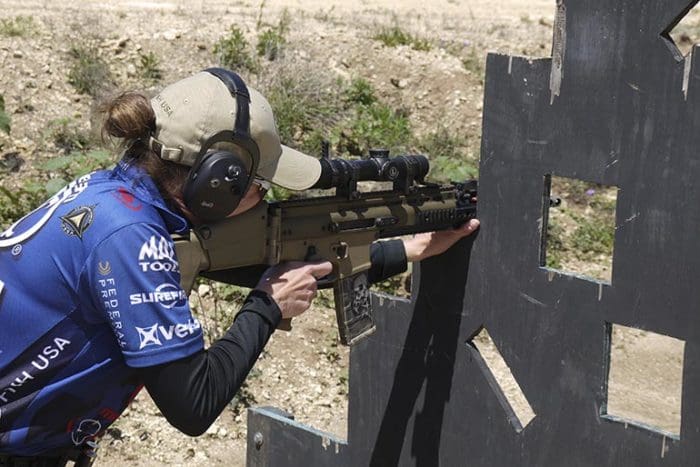I need to preface this piece by stating that up until two months ago, I had only shot a handful of carbine competitions with my good old friend MC, whose interviews you’ve all seen here on TTAG. Some of these competitions involved the option of transitioning from carbine to pistol during a few of the stages, but this wasn’t mandatory.
After doing this, I decided that my pistol skills needed a lot of work and that I would refrain from doing anything requiring speed until I had a much better grasp of pistol handling and marksmanship. I simply felt that speed was complicating the struggles I was already having and was also concerned about developing bad habits under stress that would come back to haunt me later.
As a dancer, I know how long it can take to unlearn a poorly learned habit, and given that I’m pretty new in my shooting life, I didn’t want to set myself up for later failure out of ignorance. Mastery of the fundamentals is something that my teacher, Jeff Gonzales, emphasizes over and over. In lieu of taking part in matches, I decided to simply show up and watch at the ones he runs at The Range Austin once a month, with a “maybe someday” observing mind.
However, a couple of months ago, Jeff caught me outside a match and asked me bluntly, “Why aren’t you in these matches?” I explained to him that I didn’t think I had enough consistency or speed to do well, and that I was concerned that my incomplete skills would break down under the stress of competition. What he said to me next was very eye-opening and ultimately the thing that changed my perspective:
Elaine, I design these competitions so that even good shooters will fail. It is essential that you fail as part of your training process. People who do not fail don’t learn where they are truly weak or where they need to work the most. These competitions are designed to count accuracy as much as speed and to be challenging for even very experienced shooters. You will fail, and you are supposed to fail.
In these competitions, you either get all the points or none of the points. It’s only under stress that you will learn where your weak points are and understand what you truly need to do in order to address those weak points. The purpose of failure is to teach us to work our way through it and become better. Those who won’t fail won’t improve, and their true skills remain untested.
I went home and thought about that for two months and then signed up for a competition.
The match involved four courses of fire, all requiring a high degree of accuracy as well as speed. Targets ranged from 3 to 20 yards, mostly paper, some 8-inch steel. There were specific instructions for progression through the courses as well as the number of shots fired per target.
In two of the courses, misses would mean that you ran out of ammo to complete the course. Movement with a loaded gun was required, as was one-handed shooting, weak hand shooting, and performance under time pressure.
As an all-or-nothing design, you had to take the time to be accurate even more than to be fast. Speed would not help you if you missed.
Strangely, the thing I learned the most from this experience was that easily 70% of what I struggled with was mental, and it was centered on one thing: a lack of confidence that I could pull off the shots.
I scotched some pretty easy shots during the first two courses of fire from lack of confidence alone, then got my act together for the harder courses and did well on those. As a result, I ended up somewhere in the middle fo the pack – 21st in a roster of 31 shooters – which isn’t bad for my first competition.
It’s obvious where I could have improved that standing. I also saw how over-confidence blew the game for several people by leading them to believe that they could sail through courses that turned out to be surprisingly difficult; the resulting surprise and frustration led them down a bad road.
Confidence is a funny thing. Not enough of it and you lack the aggression you need to properly command your weapon. Too much of it and you will lose your nerve and your strength of mind when things head south.
I thought a lot about something my friend MC says – that there are recreational shooters, competent shooters, and competitive shooters. The recreational shooter never clicks into what he calls “the mind of a predator,” where you become calm, clear, steady, and focused in the midst of a lot going on. The competent shooter finds and loses it. The competitive shooter lives in that space and has practiced and fine-tuned enough that even after a break, those skills will always be there.
After the match, these concepts and experiences are much more clear for me.
I never used to see the value of competitions in defensive training. Now it all makes sense; it’s the mind one is training most of all. And the side benefit is that it turns out to be fun as hell.
